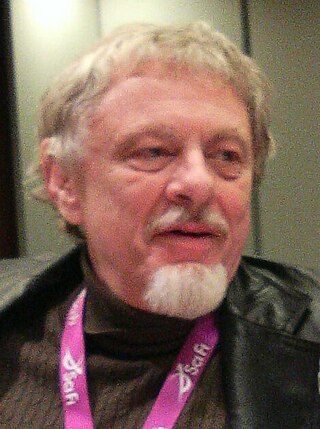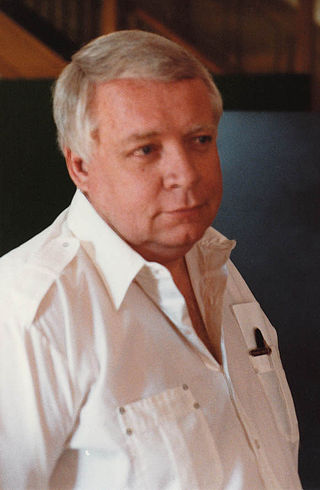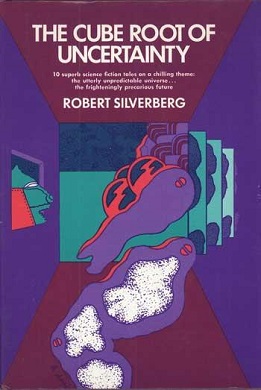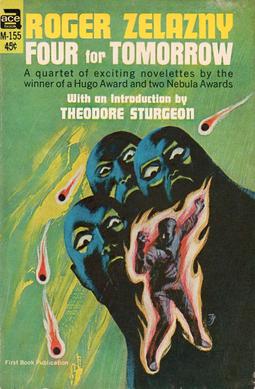The New Wave was a science fiction style of the 1960s and 1970s, characterized by a great degree of experimentation with the form and content of stories, greater imitation of the styles of non-science fiction literature, and an emphasis on the psychological and social sciences as opposed to the physical sciences. New Wave authors often considered themselves as part of the modernist tradition of fiction, and the New Wave was conceived as a deliberate change from the traditions of the science fiction characteristic of pulp magazines, which many of the writers involved considered irrelevant or unambitious.

Damon Francis Knight was an American science fiction author, editor, and critic. He is the author of "To Serve Man", a 1950 short story adapted for The Twilight Zone. He was married to fellow writer Kate Wilhelm.

Dangerous Visions is an anthology of science fiction short stories edited by American writer Harlan Ellison and illustrated by Leo and Diane Dillon. It was published in 1967 and contained 33 stories, none of which had been previously published.

Norman Richard Spinrad is an American science fiction author, essayist, and critic. His fiction has won the Prix Apollo and been nominated for numerous awards, including the Hugo Award and multiple Nebula Awards.

Algirdas Jonas "Algis" Budrys was a Lithuanian-American science fiction author, editor and critic. He was also known under the pen names Frank Mason, Alger Rome in collaboration with Jerome Bixby, John A. Sentry, William Scarff and Paul Janvier. In the 1990s he was the publisher and editor of the science fiction magazine Tomorrow Speculative Fiction.

Lester del Rey was an American science fiction author and editor. He was the author of many books in the juvenile Winston Science Fiction series, and the fantasy editor at Del Rey Books, the fantasy and science fiction imprint of Ballantine Books, subsequently Random House, working for his fourth wife Judy-Lynn del Rey’s imprint, Del Rey.

Theodore Edwin White is an American science fiction writer, editor and fan, as well as a music critic. He writes and edits as Ted White. In addition to books and stories written under his own name, he has also co-authored novels with Dave van Arnam as Ron Archer, and with Terry Carr as Norman Edwards. He won a Hugo Award in 1968.
The complete bibliography of Gordon R. Dickson.
Joseph Lee Green is an American science fiction author and a charter member of the Science Fiction Writers of America. He is a prolific short story author best known for his novel Gold the Man. His work has been translated into German, Italian, Spanish, French, Polish and Dutch.

The 1974 Annual World's Best SF is an anthology of science fiction short stories edited by Donald A. Wollheim and Arthur W. Saha, the third volume in a series of nineteen. It was first published in paperback by DAW Books in May 1974, followed by a hardcover edition issued in September of the same year by the same publisher as a selection of the Science Fiction Book Club. For the hardcover edition, the original cover art of Jack Gaughan was replaced by a new cover painting by Victor Valla. The paperback edition was reissued by DAW in December 1979 under the variant title Wollheim's World's Best SF: Series Three, this time with cover art by Vicente Segrelles. A British hardcover edition was published by The Elmfield Press in October 1975 under the variant title The World's Best SF Short Stories No. 1.

The 1981 Annual World's Best SF is an anthology of science fiction short stories edited by Donald A. Wollheim and Arthur W. Saha, the tenth volume in a series of nineteen. It was first published in paperback by DAW Books in May 1981, followed by a hardcover edition issued in August of the same year by the same publisher as a selection of the Science Fiction Book Club. For the hardcover edition the original cover art of Michael Mariano was replaced by a new cover painting by John Gampert.

World's Best Science Fiction: 1966 is an anthology of science fiction short stories edited by Donald A. Wollheim and Terry Carr, the second volume in a series of seven. It was first published in paperback by Ace Books in 1966. It was reprinted by the same publisher in 1970 under the alternate title World's Best Science Fiction: Second Series. An Italian edition appeared in December 1966 under the title Il vento del sole.

World's Best Science Fiction: 1970 is an anthology of science fiction short stories edited by Donald A. Wollheim and Terry Carr, the sixth volume in a series of seven. It was first published in paperback by Ace Books in 1970, followed by a hardcover edition issued in September of the same year by the same publisher as a selection of the Science Fiction Book Club and a British hardcover edition issued in November of the same year by Gollancz.

The Cube Root of Uncertainty is a collection of science fiction short stories by American writer Robert Silverberg, published in hardcover by Macmillan in 1970 and issued in paperback by Collier Books in 1971. No further editions have been issued.

A Song for Lya is the first collection of stories by science fiction and fantasy writer George R. R. Martin, published as a paperback original by Avon Books in 1976. It was reprinted by different publishers in 1978 and in 2001. The title is sometimes rendered A Song for Lya and Other Stories. A Song for Lya won the 1977 Locus Poll as the year's best story collection.

Four for Tomorrow is the first story collection by Roger Zelazny, published in paperback by Ace Books in 1967. British hardcover and paperback editions followed in 1969, under the title A Rose for Ecclesiastes. The first American hardcover was issued in the Garland Library of Science Fiction in 1975. A French translation appeared in 1980. Paperback reissues continued from Ace and later from Baen Books into the 1990s.

List of the published work of Robert Silverberg, American science fiction author and editor. A complete list would include over 500 books.

Alpha 2 is a science fiction anthology edited by Robert Silverberg, first published as a paperback original by Ballantine Books in November 1977. No further editions have been issued.

The Best of John Brunner is a collection of science fiction short stories by British author John Brunner. It was first published in paperback by Ballantine/Del Rey in November 1988 as a volume in its Classic Library of Science Fiction.















